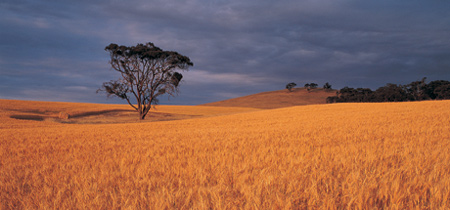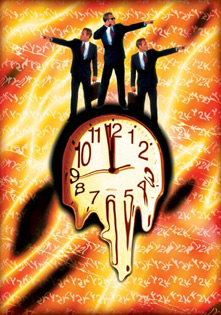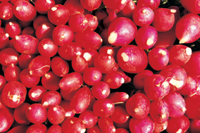
There are more and more farmer labors coming to cities to find their jobs, and there are more and more famous agricultural stock companies appears in China, the famous international brand names make us able to enter the new stage of the development of Chinese agriculture and countryside economy --- a epoch of challenge for market and internationalization is coming. How our agricultural enterprises utilize this historic opportunity to display our advantage and avoid our disadvantage, to display the comparative advantage in our country’s agricultural human resources in numbers and structure?
Interview of Dr. Cheng Guo Qiang (researcher of the development and research center of the State Council)By Jonny
Journalist: What is the basic structure of our agricultural human resources? What kind of people will face directly the competition after the entry of WTO.
Cheng Guo Qiang: In agriculture, there are two problems at present for the structure of human resources. First, the most agricultural producers have very low ability, they are relatively in low position in the aspect of education, production skills, and ability in processing and marketing. This is the fact we are facing. Second, as an industry, the agriculture except producers needs also the management people–including marketing and sales, processing and packing, personnel of such people are in short supply, and the structure of human resources is not reasonable. For long time, the training of agricultural personnel is focusing on scientific research personnel and technical people, much more than personnel for processing, sales and marketing. But the competition of agriculture does not show only on the research abilities, we don’t have now the effective method for market and mass production yet. In agricultural production, we are short of the experienced sales and marketing personnel, our original human resources training mechanism including some agricultural universities does not cover this section yet. From the point of view that we entered WTO and we participate the international competition, the sales section of the existing Chinese agricultural personnel will face strong competition.
Journalist: In this case after the entry of WTO, in what model the foreign agricultural sales section will come to the Chinese market? Or we say how the sales personnel from home and abroad would compete, and in what model?
Cheng Guo Qiang: My understanding is, foreign agricultural enterprises have a set of compact sales and marketing strategy, and through their sales and marketing strategy they penetrate and share the international market. Except their advantage in quality and price, for example big deals for agricultural products such as wheat, soya beans, etc. The most important is their marketing and competition strategy. Take food industry for example, we have seen the foreign fast food industry has achieved success in China. The success of the foreign fast food enterprises mainly depends on their sales concepts, it does not mean that foreign fast foods are too delicious so that they can attract Chinese children, but because of their earlier development of Chinese fast food market, and they creates special sales and marketing model and consuming environment, so that they can nibble at the Chinese fast food market. Why some Chinese local snacks cannot expand as they do? The reason behind, except the power of capital, marketing, is probably the question of human resources. We really appreciate the sales and marketing strategy of foreign fast food industry and those talents with strategic foresight. They know how to realize localization in China (a kind of most economic talents strategy for foreign enterprises). All foreign enterprises entering China need the process of localization, they must make reseaches on the culture, consumption tendency, consumption habit and market characteristics of all regions, especially they use their enterprise regulations to use fully local talents and resources, to win the Chinese market with the management of high-tech content and low cost.

Journalist: In this case, how our country could train the sales and marketing personnel with international competitiveness? How could we use the limited human resources for us, but not on the contrary?
Cheng Guo Qiang: No matter agriculture or any other profession, after the entry to WTO, and in the background that the Chinese market is internationalized and competition becomes harder, talents as a kind of strategic resources, its significance become more and more important. If we want to win the international competition, we must control the peak, and the key to control the peak is the talent.
I believe in the agricultural field we are in serious short of entrepreneurs who understand sales, marketing and market strategy, and we are also in short of personnel for technology development and market exploration, and this is the key for the future training of agricultural personnel. The entry to WTO means that the domestic agriculture will be internationalized and international products will become domesticalized. And Chinese agriculture talents will be able to access to the international market. For example our animal husbandry products, vegetables, fruits, although have obvious cost and price advantage, but how to enter the world market, we still need to do a lot of work, which includes improve the quality, resolving the problems of hygiene and inspection. But I think the actual problem is to make the domestic enterprise internationalized.

If we want to send our animal husbandry products, vegetable, fruits to the tables of consumers in different areas in foreign countries, the basic requirement is we must accord with the habits of foreign consumers. And this requires us to meet the requirements and standards of Japan, Europe, American and other markets, we must follow the sales channels they are familiar with, to offer agricultural products they are satisfied with ---- This is the process of enterprise internationalization. This requires our enterprises to have a number of talents who understand international market explorations. The degrees of talents are not a must, but they must have been experienced in the market competition. It is clear from the point of participation of international competition, we also need personnel with internationalized strategy, we should say, it is a process of localization for foreign international companies to enter Chinese market, and in future, our enterprises, no matter state-owned or private-owned, at home or going out of the country, will all face the process of internationalization. The localization of international companies is the process of competition in attracting talents with us. In the background of shortage of agricultural sales and marketing personnel, it is very urgent right now to speed up the transfer of functions of government and education, to speed up the construction of the laws and mechanisms of agricultural sales and marketing sections. Otherwise the situation of shortage of agricultural personnel will be more serious.
 
Journalist: What is the mainstream of agricultural competitors in our country right now? Is that the big state-owned enterprise such as Xinjiang Construction Group, or the civil agricultural enterprises such as Mr. Liu Yong Hao’s?
Cheng Guo Qiang: The entry of WTO brings us a lot of challenge to our country’s agricultural management system, main agricultural competitors and agricultural products. Right now our main attention is the mainstream of agricultural competition. According to our country’s status, we have built the system that the family is the basis for the management contracted responsibility, unified and individual combined double management system. This is a basic system we cannot change. But on the other hand, thousands of small family business, after entering the stage of internationalization, no matter on scale, efficiency or competitiveness, could not suit the challenge of international competitions, which becomes harder day-by-day. Especially, on one hand, our agricultural industrialization management level is still low, although some big enterprises appear, but still no big grain dealer, animal husbandry dealer, garden products dealer and food processing manufacturers participating in the international market shares and competition; on the other hand, the organization level is low, the middle man working in between of farmers and market is far less than demand, there are not enough mainstreams for market competition, the socialized agricultural service system is backward, so that in principle our agriculture is not competitive in comparison of state agriculture which has high grade in organizational industrialization, intensive management, in big scale and commercialized operation.
The foreign enterprises coming to Chinese market for agricultural products are mainly in two ways. One is the competitive international companies, such as Jiaji, Bangji, Luyida, etc, they already entered the Chinese market with their marketing strategy, sales strategy, global strategy and company management regulations, they realize their market competition strategy by using talents coming from all over the world. Their advantage, except using their capital as their backup force, is to use localized talents and his own country’s enterprise competitiveness. It is too convenient for them. Everybody is Chinese and knows what the market demand is, and what is not. Especially the domestic sales skills. Americans prefer to have the open restriction with contracts, but Chinese people pay attention to private relations, and rely on the relations of private credits. For example, a manager of a local cereal enterprise, has vast personal relations in this field, if he was taken away by international companies for employment, only by one phone call, he is able to build up new business network by using his original credit relations. The competition advantage of big foreign companies based on their attention to the sales talents and the combination of local sales experiences, which is difficult for Chinese enterprises to compete.
  
Further, the other kind of mainstream for competition is the organizations in professions jointly organized by farmers and medium and small enterprises. At present there are a lot of foreign agricultural organizations like this in China, there are six such organizations only from America. For example the American orange association represents the interests of thousands of orange farmers in US, in recent years, they have successfully sold their high price oranges to Chinese market, the American soya association collects the Chinese soya production and market price information for American farmers, and promote American soya products in Chinese market.
To farmers, Heilongjiang Agricultural Exploration and Xinjiang Constructionsgroupsand other enterprises in our country have advantages of big scale and good agricultural foundation conditions, and they are the main body in our country’s agriculture for international competition. But these enterprises are facing the problem of creation of system and mechanism. Without new mechanism, the advantage of these enterprises will not be able to display.

Journalist: The changes of enterprise mechanism will surely influence farmers. Is it true that more and more farmers will leave their agricultural land? And who will play the role of the main body of the agriculture?
Cheng Guo Qiang: It will be the natural trend for economic development that more and more farmers will leave their land. With the development of civilization and industrialization, non-agricultural organizations will attract more farming labors. The way-out for Chinese agriculture is to reduce number of farmers. We must try to let farmers to leave their agricultural land if they are able. Family farming will always be the production unit, and they can never become the main body of the market. The competition of agriculture market will be undertaken by agricultural enterprises. So if more farmers leave the agricultural land, it will be favorable for the main body of the competition in agriculture. If the agriculture employment population from the present 50-60% has been reduced to 20-30% or even lower, a competitive agriculture will be formed. At present our agriculture is still the agriculture to resolve problems of existence and food for farmers, it is still far from market agriculture and competitive agriculture.
Journalist: In general facing the new situation of agricultural internationalization, what kind of reform we should have for the human resources system in agriculture.
Cheng Guo Qiang: In the background of agricultural internationalization, we need first of all multi-element human resources for agriculture. We not only need high ability agricultural producers, but also experts in science and technology to control the peak position. However, the most urgent thing is, we need to train a big number of agricultural products sales and marketing, enterprise strategic management and international business management personnel. Further, we have to resolve the contradictions of the shortages of structures of talents. Facing the hard competition in attracting talents, the creations of internationalized systems have to be done by the government covering the human resources management to be suitable for the market. We can not afford to lose this market.
|
![]() 本网站由北京信息港提供网络支持
本网站由北京信息港提供网络支持








